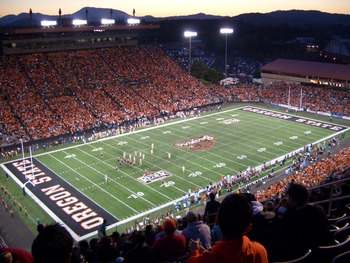 |
| Yeah, I just totally went there. |
Whenever I watch college football on television, I think to myself, "Man, this place is loud. How is anyone not mute or deaf after this game?"
You think to yourself, why are spectator sports really called spectator sports? Believe me, it isn't just because people like to watch the sport and sit there with their pipes and curly mustaches like we're in the days of Babe Ruth and Joe DiMaggio. It's because spectators will relentlessly root for their team; in the meantime, they'll boo and jeer the opponents out of the stadium if they have to. Think Texas/Oklahoma or Army/Navy just to name a few college game examples.
Different factors such as mascots, cheerleaders, and supporter groups like the Black Hole and the Hogettes help the home team's cause and give the home team that extra little boost to perform at their strongest.
If you're in the right kind of sports city, the crowd will let you know that you're doing a terrible job as well. Cities such as New York and Philadelphia (I know this all too well with the Eagles) will even boo at their home team after a crappy job in practically giving away the game to the other team.
It's funny, but I am currently taking a sports psychology course at my school and we were just talking about this concept on Monday night. Note this too--I began writing this post that afternoon before reading the gist of the chapter. Weird, eh? Basically, we discussed that the concepts of home-field advantage have been the center of research over the past several years. Although the facts of home-field advantage date back to well over 100 years ago, there has been evidence present of phenomena such as "choking." Sound familiar? People will argue that since there are higher stakes, there's added pressure that comes along with the loudness of the crowd and the anxiety-filled atmosphere. When you think about it, that makes a boatload of sense, right?
You also have to figure in this tidbit: if a tree falls in the woods, is it going to make a sound if someone is there to listen to it? Teams that hardly have an attendance at their games will have to work from the bottom-up if they need an extra push to get back into the game. You will often see fans from the opposing team file into the stadium to support the team and give them the home-filed atmosphere that they are most familiar with. If the actual home team doesn't have a fanbase of their own to begin with, how are they going to get a momentum shift from an outside force? I won't lie, I do feel a little better when I'm up to bat and someone's cheering for me. That's just my preference though.
I even remember watching a friend playing NCAA Football (I forget which year, to be honest) and while the guys are placed on the line of scrimmage, you have the capability to make a play "raise the roof" and make the crowd louder. That had to have been the weirdest function I've ever seen on a game, but apparently it was really useful to the person playing the game.
There are probably numerous naysayers that will say that the crowd does nothing and that the only way a player will work at their optimum level is if they stay focused and disregard the crowd. I heavily disagree with this statement, and the main reason is because athletes will want to play and they will want to make themselves as well as other people happy. That is our goal in life: happiness. Sure, you could play your heart out and not care what anyone else thinks about you, but when you have [what seems like] the world behind you in doing something, doesn't that give you a spurt of confidence? Doesn't that fine-tune your focus a little bit more? Playing to love the sport is one thing, but playing to entertain is another aspect that usually isn't looked into. When I played softball, I played it because I loved to play. In hindsight, I was also seen as an athletic entertainer; my parents and other family members enjoyed the heck out of watching me play my heart out. Because they loved to see me at my best, they cheered for me. Isn't that what a crowd does for an athlete they love?
There's a lot of lingo out there such as "the sixth man," or "the tenth man," and those extra guys are the people in the bleachers and the stadium seating. Why? They have the heart and soul to inspire the guys playing out on the field. We have that extra manpower to push the other guys to greatness. Sure, we might not always understand everything about the sport, but we know that positive reinforcement never really hurt anybody in the long run...
They are the keymasters.
--AZ

